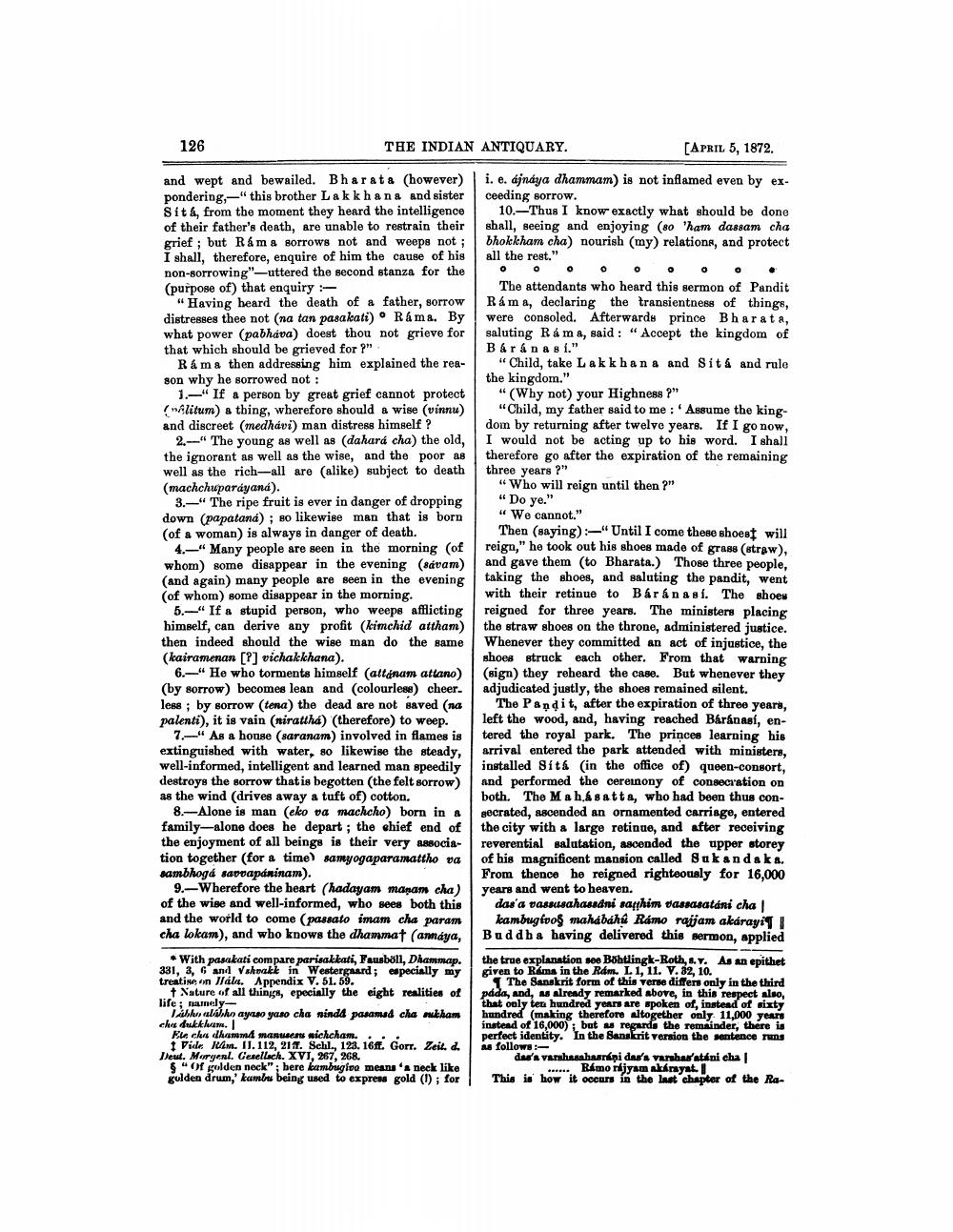________________
126
THE INDIAN ANTIQUARY.
[APRIL 5, 1872.
i. e. ajnaya dhammam) is not inflamed even by exceeding sorrow.
10.-Thus I know exactly what should be done shall, seeing and enjoying (80 'ham dassam cha bhokkham cha) nourish (my) relations, and protect all the rest."
and wept and bewailed. Bharata (however pondering,"this brother Lakk hana and sister Sit &, from the moment they heard the intelligence of their father's death, are unable to restrain their grief ; but Rám a sorrows not and weeps not ; I shall, therefore, enquire of him the cause of his non-sorrowing"-uttered the second stanza for the (purpose of) that enquiry S
"Having heard the death of a father, sorrow distresses thee not (na tan pasakati) Ráma. By what power (pabhava) doest thou not grieve for that which should be grieved for ?"
Ráma then addressing him explained the reason why he sorrowed not :
1.-" If a person by great grief cannot protect
Alitum) a thing, wherefore should a wise (vinnu) and discreet (medhavi) man distress himself ?
2.--" The young as well as (dahará cha) the old, the ignorant as well as the wise, and the poor as well as the rich-all are alike) subject to death (machchuparáyand).
3.-" The ripe fruit is ever in danger of dropping down (papatand); so likewise man that is born (of a woman) is always in danger of death.
4.-" Many people are seen in the morning (of whom) some disappear in the evening (sávam) (and again) many people are seen in the evening (of whom) some disappear in the morning.
5.-" If & stupid person, who weeps afflicting himself, can derive any profit (kimchid attham) then indeed should the wise man do the same (kairamenan [?] vichakkhana).
6.-"He who torments himself (atldnam attano) (by sorrow) becomes lean and colourless) cheer. less; by sorrow (tena) the dead are not saved (na palenti), it is vain (nirattha) (therefore) to weep.
7.-"As a house (saranam) involved in flames is extinguished with water, so likewise the steady, well-informed, intelligent and learned man speedily destroys the sorrow that is begotten (the felt sorrow) as the wind (drives away a tuft of) cotton.
8.-Alone is man (eko na machcho) born in A family-alone does he depart; the chief end of the enjoyment of all beings is their very association together (for & timesamyogaparamattho va sambhogá sauvapáxinam).
9.-Wherefore the heart (hadayam manam cha) of the wise and well-informed, who sees both this and the world to come passato imam cha param cha lokam), and who knows the dhammat (annaya,
With pasakati compare parisakkati, Fausböll, Dhammap. 331, 3, 6 and Vahvakk in Westergaard; especially my treatise on Jlálu. Appendix V. 51. 59.
1 Nature of all things, epecially the eight realities of life; ruinely
Tálkn alashnayzao yako cha ninda posamed cha mukham cha doukk hum.
Eu cha dhamma maswens nichcham...
1 Vide Kim. 11. 112, 211f. Schl., 123. 16. Gorr. Zeild Deut. Morgenl. Gesellsch. XVI, 267, 268.
& Of golden neck"; bere kambrigido means neck like gulden drum,' kamis being used to express gold (1); for
The attendants who heard this sermon of Pandit Ráma, declaring the transientness of things, were consoled. Afterwards prince Bharata, saluting Ráma, said: “Accept the kingdom of Bárána s 1."
"Child, take Lakkhana and Sit & and rule the kingdom."
"(Why not) your Highness ?"
"Child, my father said to me : Assume the kingdom by returning after twelve years. If I go now, I would not be acting up to his word. I shall therefore go after the expiration of the remaining three years ?"
“Who will reign until then ?" "Do ye." “We cannot."
Then (saying) "Until I come these shoest will reign," he took out his shoes made of grass (straw), and gave them (to Bharata.) Those three people, taking the shoes, and saluting the pandit, went with their retinue to Báránasi. The shoes reigned for three years. The ministers placing the straw shoes on the throne, administered justice. Whenever they committed an act of injustice, the shoes struck each other. From that warning (sign) they reheard the case. But whenever they adjudicated justly, the shoes remained silent.
The Pandit, after the expiration of three years, left the wood, and, having reached Báránasí, entered the royal park. The princes learning his arrival entered the park attended with ministers, installed Sita (in the office of) queen-consort, And performed the ceremony of consecration on both. The Ma há satta, who had been thus congecrated, ascended an ornamented carriage, entered the city with a large retinue, and after receiving reverential salutation, ascended the upper storey of his magnificent mansion called Sukandaka. From thence he reigned righteously for 16,000 years and went to heaven.
das'a vassusahasadni sathim dassasatáni cha
kambugivos mahabahů Rámo rajjam akárayil Buddha having delivered this sermon, applied the true explanation see Böhtlingk-Roth, s.v. As an epithet given to Rems in the Rám. L1, 11. V. 12, 10.
The Sanskrit form of this verse differs only in the third pdda, and, as already remarked above, in this respect also, that only ten hundred years are spoken of, instead of sixty hundred (making therefore altogether only 11,000 years instead of 16,000); but us regards the remainder, there is perfect identity. In the Sanskrit version the sentence runs as follows: das'a vatshasahasrani das's vanhas'aténi cha
...... Remo rájyam akarayat. This is how it occurs in the last chapter of the Ra




